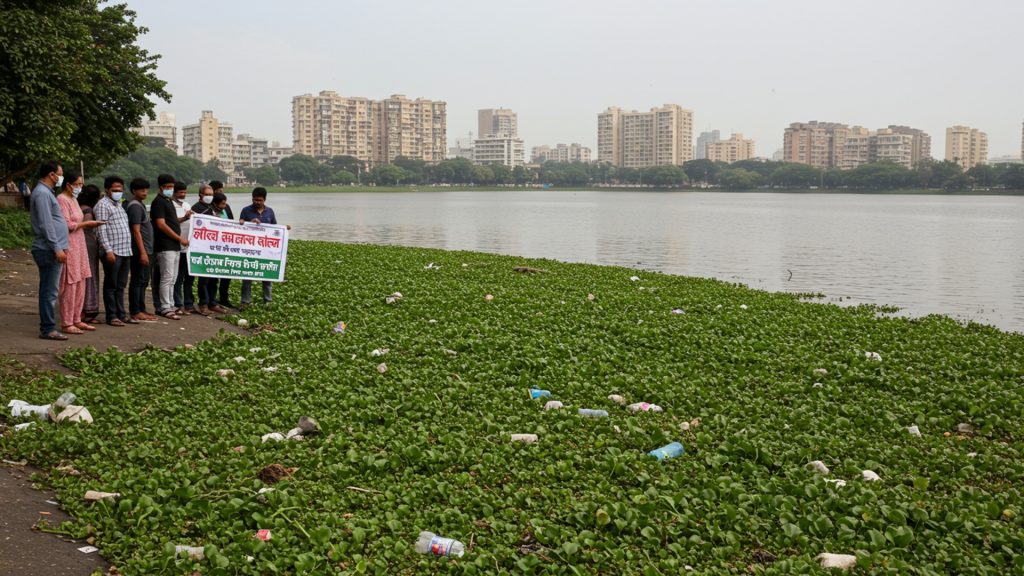Environmental groups in Mumbai begin an urgent clean-up of Powai Lake today, responding to critical levels of pollution threatening its ecosystem. This vital water body, once a natural treasure, now chokes with plastic and waste, severely harming fish and plants. With the lake’s health worsening fast, volunteers and local people are now working together in a massive effort to clear the accumulating trash and save this key part of the city’s environment before it is too late.
Understanding the Problem: Powai Lake’s Decline
Powai Lake, an artificial lake in Mumbai, has been facing severe environmental problems for a long time. Once a source of drinking water, its condition has worsened due to untreated sewage, industrial waste. plastic trash. The government of Maharashtra has reported that the lake water is now unfit for drinking due to eutrophication, a process where excessive nutrients lead to dense plant growth and oxygen depletion.
The lake, originally built in 1890 to support Mumbai’s water supply, covers a large area in the eastern suburbs. But, within five months of its creation, it was no longer used for drinking water because of high pollution levels.
Over the years, uncontrolled urban expansion around the lake, including residential complexes and informal settlements, has added to the pollution burden. More than 18 million liters of sewage water enter the lake daily from 18 different points. This continuous inflow of waste, along with plastic bags, bottles. other garbage, has severely impacted the lake’s health.
The pollution has led to a significant decrease in oxygen levels in the water, which is harmful to aquatic life. The lake is home to various species, including Indian marsh crocodiles. their survival is at risk.
Why the Urgent Clean-up Now?
Environmental groups and local residents have often carried out clean-up activities at Powai Lake. The current urgent drive comes after a noticeable increase in trash and water hyacinth, especially after recent heavy rains. Water hyacinth is an invasive plant that covers the lake surface, blocking sunlight and further reducing oxygen in the water.
The Brihanmumbai Municipal Corporation (BMC) has tried to remove water hyacinth in the past, with efforts clearing large amounts of the plant. But, the growth rate of this plant often exceeds the removal efforts, making it a continuous challenge.
Recently, the National Green Tribunal (NGT) also took note of the lake’s worsening condition. The NGT has formed a special committee with members from the Central Pollution Control Board, Maharashtra Pollution Control Board. Maharashtra State Wetland Authority. This committee has been asked to inspect the lake and suggest ways to fix the pollution problem.
Who is Involved in the Drive?
The clean-up is a joint effort by many groups, showing strong community involvement. Organizations such as ‘Mumbai Green Warriors,’ ‘Save Powai Lake Forum,’ Earth5R. NatConnect Foundation are leading the charge.
Hundreds of volunteers are taking part, including students, local residents. corporate employees. They are working together to pick up trash from the lake shores and using boats to collect floating waste from the water.
For example, Earth5R ran a four-year program from 2018 to 2023, organizing weekly clean-ups with an average of 70 volunteers each Sunday, removing over 58 tonnes of waste. IIT-Bombay’s Abhyuday team has also organized clean-up drives, with hundreds of volunteers clearing tonnes of garbage from the shoreline.
“Citizens should place flowers, garlands and other objects in the sacred urn placed nearby. Plastic should be discarded in dustbins,” boards put up by the BMC near Powai lake say. Despite this, the water still has a lot of garbage, plastic bags, bottles. other items.
What Are the Plans for the Clean-up?
The current drive focuses on removing solid waste, especially plastic. controlling the growth of water hyacinth. Volunteers are actively collecting trash by hand from the edges of the lake.
There is also a push for better waste management systems around the lake, including proper segregation of waste at the source. This means separating biodegradable and non-biodegradable waste to make recycling easier.
For larger scale cleaning, the BMC has plans to use more floating weed-removal machines and increase manpower. But, environmental experts point out that just removing waste mechanically is a short-term solution.
The more vital long-term plan involves stopping the flow of untreated sewage into the lake. The BMC has taken steps to divert sewage lines and set up new sewage treatment plants (STPs) to process the wastewater before it reaches the lake. One such plan includes diverting 8 million liters per day (MLD) of sewage to a new STP at the old Powai pumping station. Other parts of the sewage will go to larger treatment facilities.
Concerns and Long-Term Solutions
While clean-up drives are vital, experts and local groups stress that permanent solutions are needed. Activists like B. N. Kumar, director of NatConnect Foundation, have highlighted that previous government directives to clean the lake have not led to lasting change.
One major concern is the continuous discharge of untreated sewage. This sewage contains high levels of harmful substances that cause the lake water to become toxic and promote the growth of unwanted plants like water hyacinth.
Another issue is improper waste disposal by local communities and businesses. This leads to plastic and other trash entering the lake daily.
Environmentalists and concerned citizens are calling for:
- Stricter rules against waste dumping.
- Improved sewage treatment infrastructure.
- Regular monitoring of water quality.
- Public education campaigns to raise awareness about the lake’s importance.
- Restoration of the lake’s natural ecosystem and biodiversity.
There have been instances where BMC’s cleaning efforts using heavy machinery were temporarily halted due to concerns from groups like the Bombay Natural History Society (BNHS) about disturbing aquatic birds and animals during their breeding season. This highlights the need for careful and eco-friendly cleaning methods.
The long-term health of Powai Lake depends on a unified approach that includes strong government action, consistent community participation. scientific methods to restore the lake’s health.

